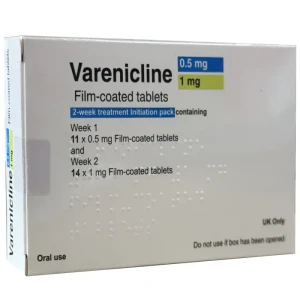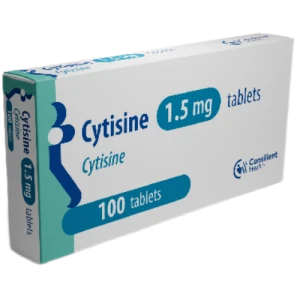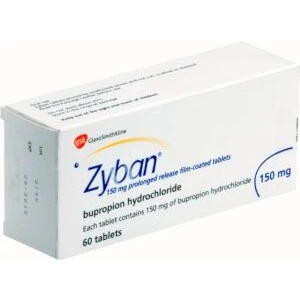The Best Stop Smoking Aids: Prescription Stop Smoking Products Compared
Table of contents:
Quitting smoking takes a great deal of strength and willpower. Not only will you regularly be fighting cravings, but you’ll also have to change the habits you’ve likely formed over a number of years, such as smoking socially.
If this feels like a daunting prospect, the good news is that you won’t need to go through it all alone. There are several stop smoking products available, ranging from patches and gum to prescription medication. Each of these has its own benefits and drawbacks, helping you break the habit in different ways.
Prescription treatments are especially effective, since they don’t contain nicotine and actively work to reduce your cravings and make having a cigarette feel less rewarding. The question is, which one should you choose? Here, we compare the best stop smoking aids that are available on prescription, so you can make an informed decision. Let’s get started.
Types of Quit Smoking Aids
Quit-smoking aids are products designed to help you stop smoking, and can significantly improve success rates among people attempting to quit. There are several types of quit smoking aids. Some of these products, like nicotine patches and gum, contain nicotine; others, like stop smoking medications, do not.
Nicotine replacement therapy (NRT) products provide people with nicotine but not the other toxic substances, like tar and carbon monoxide, found in cigarettes. They can help reduce tobacco withdrawal symptoms and make it easier for users to quit smoking. NRT products are available over the counter and via prescription, and include:
- Skin patches
- Nicotine chewing gum
- Oral strips
- Lozenges
- Microtabs
- Mouth and nasal sprays
Though not considered NRT products, vapes may also be an effective tool for smoking cessation and seem to be less harmful than cigarettes.

Stop smoking prescription medication may be an option for those who want to quit but have been unsuccessful with NRT products. Three such medications available on prescription in the UK are:
- Varenicline
- Cytisine
- Zyban
Why Choose Stop Smoking Prescription Medication
Stop smoking prescription medications work by reducing nicotine cravings and making smoking less pleasurable. While Varenicline and Cytisine block the effects of nicotine and the brain, Zyban (commonly known as Bupropion) alters brain chemistry in a way that reduces nicotine cravings.
You may decide to give these medications a try if you have attempted to quit smoking in the past but have been unsuccessful with NRTs. Some stop smoking medications are among the most effective options for quitting and help by:
- Reducing tobacco withdrawal symptoms
- Curbing nicotine cravings
- Addressing how nicotine affects the brain
Smoking cessation medications are also far safer than continuing to smoke, as they don’t contain the hundreds of harmful chemicals present in tobacco smoke.
The Best Prescription Smoking Cessation Aids
The three main smoking cessation medications available on prescription in the UK are Varenicline, Cytisine, and Zyban. Research has confirmed that all three can help people to stop smoking by reducing tobacco withdrawals and cravings, and by altering how the brain responds to nicotine.
Let’s take a look at these impressive quit smoking aids in more detail:
Varenicline
Varenicline, formerly available in the UK under the brand name Champix, works by reducing tobacco cravings and withdrawal symptoms. It also makes smoking less pleasurable, making you less likely to continue smoking if you have a cigarette during treatment.
Varenicline is considered one of the most effective smoking cessation aids, with one study finding that 22-23% of people on this medication were smoke-free after 1 year of treatment. This study also notes that Varenicline is even more effective when combined with other quitting aids, like NRTs and Zyban.
The recommended treatment plan for Varenicline is 1 mg twice a day for 12 weeks. People who successfully stop smoking after 12 weeks may be advised to undergo a further 12 weeks of treatment to help them stay on track.
Varenicline Smoking Cessation
- Reduces cravings & withdrawal symptoms
- Blocks the rewarding effect of smoking
- Higher long-term quit rates
Cytisine
Cytisine, a plant-based medication derived from laburnum seeds, has been a popular smoking cessation tool in Eastern European countries for decades. The efficacy of Cytisine as an anti-smoking medication is comparable to that of Varenicline. One study reported that smokers are twice as likely to quit using Cytisine vs. a placebo, largely thanks to reduced tobacco cravings.
Cytisine has a short treatment plan and can help people quit smoking after just 25 days. They work best when taken according to the dosing schedule, rather than in response to cravings.
Cytisine
- Natural origin
- Reduces cravings and withdrawal symptoms
- Short, structured treatment course
Zyban
Zyban, also known as bupropion, is an antidepressant that can also help people quit smoking. Unlike Varenicline and Cytisine, which curb tobacco cravings, Zyban works by altering the brain chemistry of smokers.
It activates cell surface proteins called cholinergic receptors, which stimulate the release of neurotransmitters such as acetylcholine, norepinephrine, serotonin, and dopamine. Nicotine addiction is primarily a result of dopamine release. Therefore, Zyban may help people to stop smoking by increasing the amount of dopamine in the brain and reducing nicotine cravings.
Studies have shown that people are up to 77% more likely to quit smoking when using Zyban, and are twice as likely to quit smoking as those using NRT. The recommended Zyban treatment plan for smoking cessation is 150 mg twice daily for 7 - 9 weeks.
Always consult a licensed clinician before starting Zyban treatment, as dose adjustments may be necessary depending on age and other health conditions. You should take this medication exactly as directed, as taking too much or abruptly stopping treatment can lead to health complications.
Zyban
- Suppresses cravings & withdrawal symptoms
- Nicotine-free
- May improve mood during quitting
Prescription Stop Smoking Aids Compared
If you’d like to see a more visual representation of how the main prescription quit smoking aids compare with each other, please refer to the table below.
| Varenicline | Cytisine | Zyban | |
|---|---|---|---|
| Active Ingredient | Varenicline tartrate | Cytisine | Bupropion hydrochloride |
| Mechanism of Action | Partial nicotine receptor agonist | Partial nicotinic acetylcholine receptor agonist | Weak inhibitor of dopamine and noradrenaline reuptake |
| Effectiveness | 55.9% quit rate after 6 months | 50.5% quit rate after 6 months | 27.9% quit rate after 6 months |
| Treatment Regimen | Up to 1 mg twice daily for 12 weeks | Structured dosing schedule for 25 days | Up to 150 mg twice daily for 7 - 9 weeks |
| Price | From £44.99 | From £157.99 | From £69.99 |
| Side Effects | Headaches Nausea Insomnia Abnormal dreams | Nausea Abdominal pain Sleep problems; Headache Dizziness Dry mouth Increased appetite Weight gain Irritability | Mood changes Difficulty concentrating Tremors Headaches Nausea; Vomiting Abdominal pain |
| Eligibility Criteria | Adults aged 18 or older who meet criteria based on age, health status, and smoking history | Adults aged 18 or older who meet criteria based on age, health status, and smoking history | Adults aged 18 or older who meet criteria based on age, health status, and smoking history |
Stop Smoking Products: Head-to-Head
Deciding which stop-smoking prescription medication to try requires careful consideration. Clinical research has shown each medication to be safe and effective for smoking cessation, but how do they compare to one another?
Cytisine vs Varenicline
Cytisine and Varenicline are both effective anti-smoking pills, but research suggests that Varenicline may produce a higher quit rate. One study reported that 11.7% of people on Cystine treatment were smoke-free after 6 months, compared to 13.3% of those on Varenicline. However, Varenicline is associated with a higher risk of side effects than Cytisine, which may lead people to end treatment early.
The main side effects of Cytisine (stomach and sleep problems) are similar to those caused by Varenicline, but they occur less frequently. Some have suggested that Varenicline treatment can also trigger mental health disturbances such as depression, psychosis symptoms, and suicidal ideation. However, studies on this topic have not found a significant difference in the rates of mental health events among people using Cytisine vs. Varenicline.
If you have any concerns about the potential side effects of anti-smoking medication, seek the guidance of a licensed clinician. They can provide more insight into how these medications work, allowing you to make a fully informed decision about your treatment plan.
Varenicline vs Zyban
Although Varenicline and Zyban are both effective anti-smoking tools, Varenicline is generally considered more effective for smoking cessation. One study reported that more people quit smoking on Varenicline treatment than on Zyban, though post-treatment relapse rates were similar for both groups.
Varenicline and Zyban also differ in terms of their potential side effects, which can be influenced by your medical history and overall health status. Zyban may cause insomnia, dry mouth, anxiety, and nausea. It may also increase users’ risk of seizures, and shouldn’t be prescribed to those who historically suffer from them.
Varenicline causes some of the same side effects as Zyban, including insomnia and nausea. It has also been linked to mood disturbances, fatigue and abnormal dreams. Always consult a licensed clinician before starting any new medication to gain a comprehensive understanding of all potential risks and side effects.
Zyban vs Cytisine
Some studies have found that cytisine produces a higher quit rate than Zyban 6 months after the start of treatment. Cytisine is generally considered more effective for smoking cessation than Zyban, though varenicline may be the most successful treatment of the three.
The potential side effects of both Cytisine and Zyban include nausea, vomiting, and dry mouth. Additionally, Zyban has the potential to cause sleep disturbances, anxiety and an elevated risk of seizures.
Stop smoking medications are only prescribed to people whose health status meets the criteria for safe treatment. If you have any questions or concerns about potential side effects and health implications of these medications, seek the guidance of a licensed clinician.

What is the Best Stop Smoking Aid on Prescription?
Determining the best stop smoking aid that’s available on prescription comes down to a number of factors. In terms of efficacy alone, Varenicline comes out on top, followed by Cytisine and then Zyban. However, that’s not the end of the story.
A major factor that determines how useful one stop smoking product is compared to another is how severely the user is impacted by side effects. Given that Varenicline can be associated with people finishing treatment early, you may find that one of the other treatments is more suitable for your circumstances.
Everyone’s journey towards becoming smoke-free is unique. What works for one person may not work for another. As such, it’s important to speak to a licensed clinician to discover which is the best quit smoking aid for you.
Effective Stop Smoking Aids From Prescription Doctor
If you’re looking to go smoke-free with prescription medication, it’s essential to choose a provider you can rely upon to support you every step of the way. This is where Prescription Doctor can help.
Not only do we offer the best stop smoking aids available on prescription, but we also provide a holistic consultation service that caters to your every need. Our licensed clinicians will regularly check in with you to monitor your progress and are available to answer any questions you may have.
In addition, we’re proud to provide a library of useful information to help you kick the habit, including guidance on social smoking, a timeline of what to expect when you quit, and the impact of stopping smoking on your body. Whatever you need, we’re here to help.
Our team can even help if you want your quit smoking aids to arrive promptly. Orders approved before 3 pm on a weekday are dispensed by our General Pharmaceutical Council-registered pharmacy for next-day delivery in discreet packaging, allowing you to obtain your medication quickly and confidentially.
Ready to get started? Begin your stop-smoking consultation today.
Sources
- UK Government (2025): Chapter 11: smoking and tobacco use.
- UK Government (2019): Health matters: stopping smoking – what works?
- Centers for Disease Control & Prevention (2025): Quit smoking medicines are much safer than smoking.
- NHS: Quit smoking with nicotine-free medicines.
- University of Oxford (2023): E-cigarettes, Varenicline and Cytisine are the Most Effective Stop-smoking Aids, Analysis of Over 150,000 Smokers Reveals.
- PubMed (2016): Varenicline for smoking cessation: a narrative review of efficacy, adverse effects, use in at-risk populations, and adherence.
- NICE (2025): Varenicline.
- ScienceDirect (2023): Cytisine for smoking cessation: A systematic review and meta-analysis.
- The Guardian (2024): Smokers twice as likely to quit by using cytisine, study finds.
- NICE: Cytisinicline.
- NIH (2024): Bupropion.
- NIHR (2020): Some antidepressants can help people quit smoking, but other medications may offer greater benefits.
- NICE (2025): Bupropion.
- Tobacco Prevention and Cessation: Cytisine for smoking cessation: A 40-day treatment with an induction period.
- PubMed (2013): Randomized trial of nicotine replacement therapy (NRT), bupropion and NRT plus bupropion for smoking cessation: effectiveness in clinical practice.
- PubMed (2021): Effect of Cytisine vs Varenicline on Smoking Cessation.
- University of Manchester (2016): Adverse Effects Cause Varenicline Discontinuation: A Meta-Analysis.
- NCSCT (2025): Cytisine.
- ScienceDirect (2024): Mental health related adverse events of cytisine and varenicline in smokers with and without mental health disorders: Secondary analysis of a randomized controlled trial.
- PubMed (2023): Efficacy of varenicline versus bupropion for smoking cessation: A systematic review and meta-analysis of randomized controlled trials.
- PubMed (2024): Smoking cessation pharmacotherapy; varenicline or bupropion?
Authored By

Kate Latham
Medical Content WriterPublished on: 23/09/2025
Reviewed By

Mohamed Imran Lakhi
MPharm - Lead PharmacistReviewed on: 23/09/2025
© 2013 - 2026 Al Muhsineen Limited. All Rights Reserved. Registered Pharmacy: 34 Halliwell Road, Bolton BL1 8RL. Registered Office: 254 First Floor, Shearbrow, Blackburn, England, BB1 8DS








